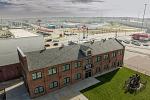Editor-in-Chief
- FMA
- The Fabricator
- FABTECH
- Canadian Metalworking
Categories
- Additive Manufacturing
- Aluminum Welding
- Arc Welding
- Assembly and Joining
- Automation and Robotics
- Bending and Forming
- Consumables
- Cutting and Weld Prep
- Electric Vehicles
- En Español
- Finishing
- Hydroforming
- Laser Cutting
- Laser Welding
- Machining
- Manufacturing Software
- Materials Handling
- Metals/Materials
- Oxyfuel Cutting
- Plasma Cutting
- Power Tools
- Punching and Other Holemaking
- Roll Forming
- Safety
- Sawing
- Shearing
- Shop Management
- Testing and Measuring
- Tube and Pipe Fabrication
- Tube and Pipe Production
- Waterjet Cutting
Industry Directory
Webcasts
Podcasts
FAB 40
Advertise
Subscribe
Account Login
Search
Harley-Davidson's plant closure leaves a void in manufacturing community
A once modern manufacturing facility is now just a testament to how fast the market moves
- By Dan Davis
- January 30, 2018

Editor-in-Chief Dan Davis reflects upon his visit to the Harley-Davidson manufacturing facility in Kansas City, Mo., which is now slated to be closed. He made the visit while a writer for Industrial Paint & Powder magazine.
The news that Harley-Davidson is planning to close its Kansas City, Mo., plant and consolidate operations at its York, Pa., facility struck a nerve with me. The simple message is that no business is safe from market forces.
The Kansas City facility sticks in my brain because it’s one of the few greenfield construction projects of that size that I’ve ever had the chance to tour. Back in 1999, when I was writing for Industrial Paint & Powder magazine, which was later renamed Finishing Today, I had the opportunity to see the state-of-the-art powder coating system that the facility employed. Harley-Davidson worked to bolster the high-end image for its motorcycles, and it applied the same thinking to its production facility, which originally was dedicated to building the company’s entry-level Sportster model. I still remember the cleanliness of the facility and seeing the lighting and advanced technology as a sign of what modern manufacturing was supposed to look like.
From a coating perspective, Harley-Davidson was embracing multiple finishing technologies to deliver a long-lived coating. It had an e-coat system for corrosion protection of fenders, frames, gas tanks, and oil tanks; a wet-spray system for the basecoat on fenders and tanks; and a powder clearcoat for quality and environmental considerations. It was a complex system that delivered colors that popped, especially two-tone finishes that required a second color application over the first finish.
And you wouldn’t believe the attention to detail given to the application of decals. These employees were dressed like they were in an ICU, and they were simply putting stickers on components like gas tanks. They were guided by laser-projected outlines to get the decals in the right place, however, which gives you an idea of just how high quality expectations were for that product.
But the market doesn’t care about that nowadays. According to a report in USA Today, Harley-Davidson’s worldwide retail motorcycle sales fell 6.7 percent in 2017 compared to 2016. A person in the comments section of a newspaper report on the plant closure summed up Harley-Davidson’s predicament nicely: “All of the customers are dying off.”
The proud brand is doing what it can to reach out to new customers, such as sponsoring rider-training programs at its dealers and offering up its motorcycles to rental companies. It’s an uphill battle, however, as younger customers who actually have disposable income look at other products, such as less expensive motorcycles or utility vehicles. Not surprising is that the younger generation doesn’t particularly want the same products their parents loved.
The international market hasn’t made up for the moribund domestic market. Even recent tax reform wasn’t enough to save the Kansas City plant from closure. Harley-Davidson needed to take a drastic step to shore up the bottom line in the face of four years of sliding sales.
The market always moves forward. What was considered modern at one time quickly can become “outdated” if the product is something no one really wants. In that case, all you are left with are memories and a large facility in Kansas City waiting for the next market opportunity.
subscribe now

The Fabricator is North America's leading magazine for the metal forming and fabricating industry. The magazine delivers the news, technical articles, and case histories that enable fabricators to do their jobs more efficiently. The Fabricator has served the industry since 1970.
start your free subscriptionAbout the Author

Dan Davis
2135 Point Blvd.
Elgin, IL 60123
815-227-8281
Dan Davis is editor-in-chief of The Fabricator, the industry's most widely circulated metal fabricating magazine, and its sister publications, The Tube & Pipe Journal and The Welder. He has been with the publications since April 2002.
- Stay connected from anywhere

Easily access valuable industry resources now with full access to the digital edition of The Fabricator.

Easily access valuable industry resources now with full access to the digital edition of The Welder.

Easily access valuable industry resources now with full access to the digital edition of The Tube and Pipe Journal.
- Podcasting
- Podcast:
- The Fabricator Podcast
- Published:
- 04/30/2024
- Running Time:
- 53:00
Seth Feldman of Iowa-based Wertzbaugher Services joins The Fabricator Podcast to offer his take as a Gen Zer...
- Industry Events
16th Annual Safety Conference
- April 30 - May 1, 2024
- Elgin,
Pipe and Tube Conference
- May 21 - 22, 2024
- Omaha, NE
World-Class Roll Forming Workshop
- June 5 - 6, 2024
- Louisville, KY
Advanced Laser Application Workshop
- June 25 - 27, 2024
- Novi, MI































